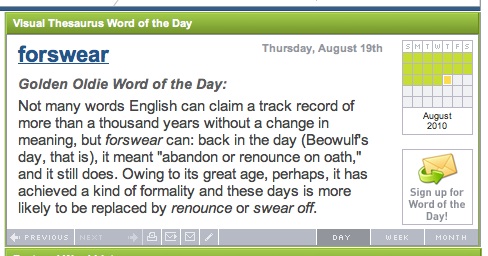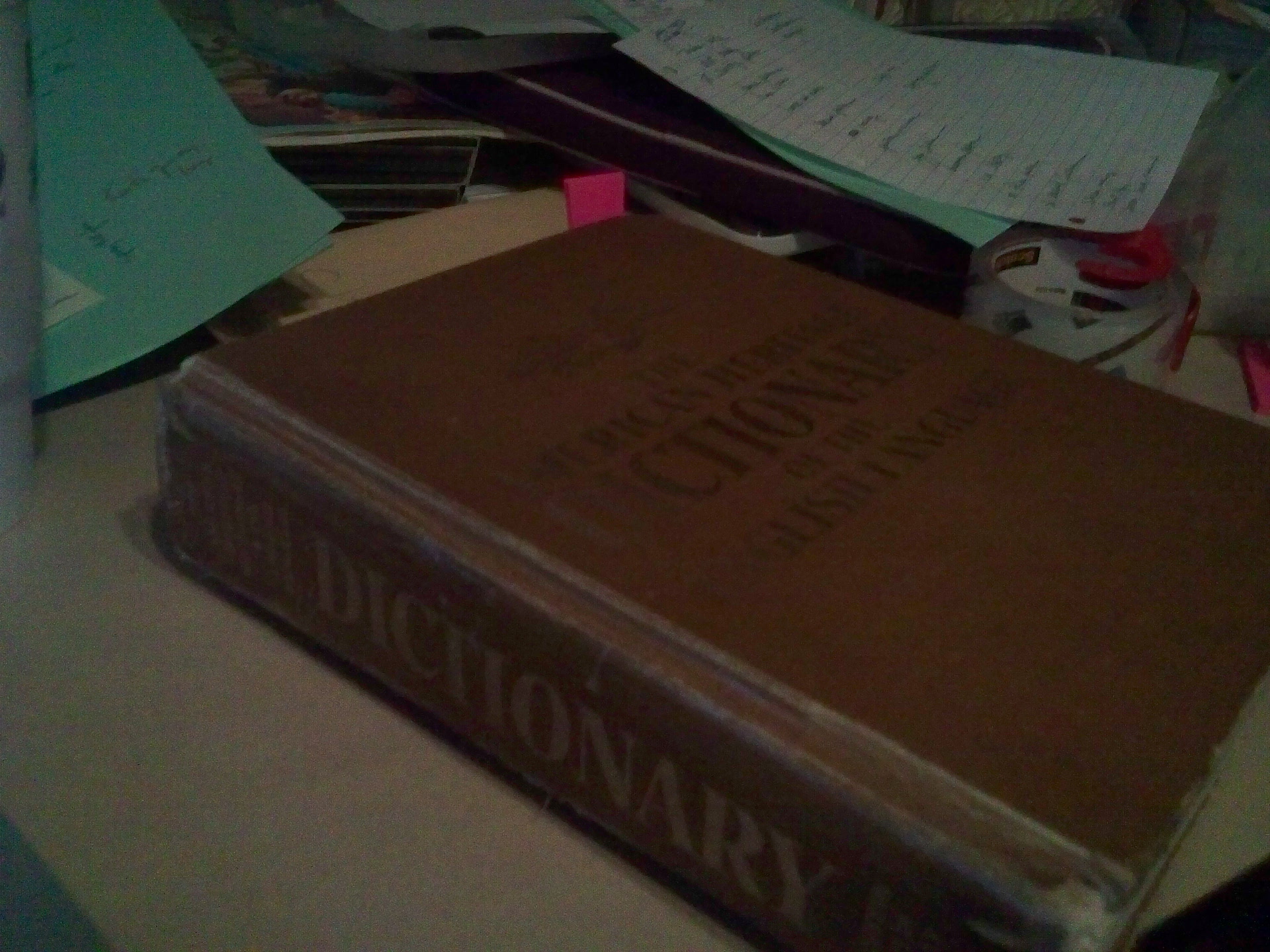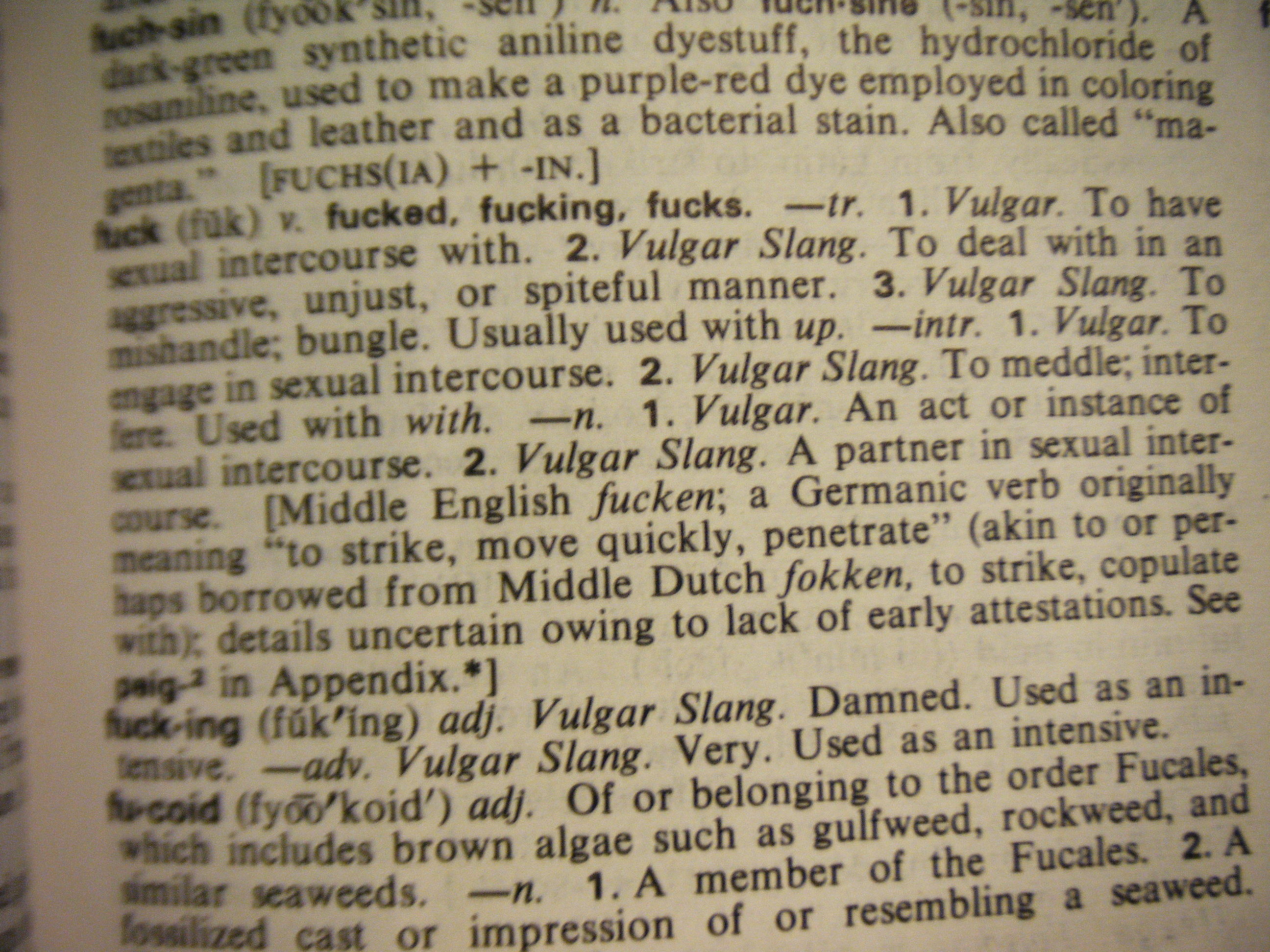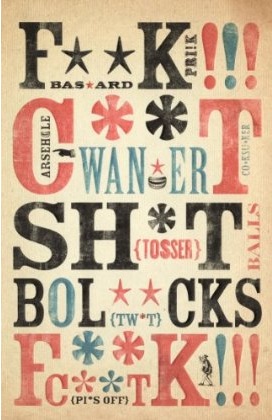Oaths, Curses and Words that Can't Be Used
For the 2010 HSC conference, I had an advance request from the teen committee to do a workshop on words that can't be used. This page began as notes and links for that presentation.

By Tamara Baluja, The Province August 5, 2010 6:23 AM
Favourite swear words included the “F-word, the S-word and all variations of ‘mother’ swear words,” said Alexandra of Vancouver. Other said they frequently use “damn”, “darn” and “balls.”
In 1969, when I was in high school, there was a national controversy in the U.S. because The American Heritage Dictionary, a new dictionary specializing etymology (word history), was including "fuck" in its new edition. There were articles and editorials and library board meetings. Schools, of course, went a little crazy, even though there was a green-covered clean (fuck-free) edition for schools. Because naturally the controversy made all the kids try to look the word up.
That's nothing new, though. In the mid 1700s when Dr. Samuel Johnson published his dictionary, the first big, famous dictionary in English. He didn't include 'dirty words.' When some women commended him for omitting "naughty words," he reportedly said, "What! my dears! Then you have been looking for them?" I own a copy of that 1969, brown-not-green American Heritage Dictionary. I was going to take it to Sacramento, but it's heavy. So here are photos of its outside and its most famous bit of insides:


Notes to anyone who comes to this page:
Use good judgment; "make good choices."Use words because you meant to, not because you couldn't help it.
NOTES for the Presentation:
Oaths, Curses and Words that Can't Be Used
Cultural taboos involving words, and some history of "bad words."1939, very famous shocking phrase in a movie
What's the big deal?
Or as Cartman said,
"What's the big deal? It doesn't hurt anybody. Fuck fuckedity fuck fuck fuck."
Responses:
"Don't be vulgar," or my Mamaw's standard: "You kiss your mother with that mouth?"
Modern insults?
You suckComic insults?
That's gay
Your mother was a hamster and your father smelt of elderberriesEuphemisms:
Gee, jeez, Jiminy Cricket Lord / laud "lawd"Even in English speaking countries, acceptable words vary. "Pissed" is used differently in the U.S. and U.K., in ways that have little to nothing to do with urine.
"I got a feelin' called the blues, oh lawd, since my baby said goodbye"
The big bad word in the U.S. is fairly common in the U.K. Their horrible bad word is just one of many here. A phrase used in one part of the U.S. might cause people not to raise an eye, while in another part of the country they'd start raising weapons.
There's a time and place.
TIME AND PLACE.

On Facebook a few weeks ago:
Wendy: Apparently, today is the day I say 'fuck' a lot.PROFANITY:Gina: Sometimes you just gotta say "What the f_ck..."
Holly: I hope that is because your day is so fuckin' awesome.
Jessica: Fuckin' A!
Cara No fucking way. Get the fuck out!
Wendy: Holly, I wish, but not so much. This morning was a long series of bad, unexpected moments.
Christopher: &%#*
Wendy: My favorite derivative is 'fucksoxs', taken from a Christopher Moore book.
Holly: One time my mom burnt herself on the hot tub stove and said "Fucky, fucky, fucky!"-- I thought that was the cutest cuss word ever! The writer was Holly Dodd, and so the mom quoted would be me.
Julie: Fuckwit is one of my all time faves, rapidly followed by fucktard....
Jessica: Fuckoes! Fuck fuck fuck oes!
Julie: That's that cereal that George Carlin advertised, wasn't it?
From Wikipedia:
The original meaning of the adjective profane (Latin: "in front of", "outside the temple") referred to items not belonging to the church, e.g. "The fort is the oldest profane building in the town, but the local monastery is older, and is the oldest building," or "besides designing churches, he also designed many profane buildings". Over time this meaning changed to the current meaning. Other words commonly used to describe profane language or its use include:
- curse,
- pejorative language,
- swearing,
- expletive,
- bad word,
- dirty word,
- cussing,
- strong language,
- irreverent language,
- obscene and/or indecent language,
- choice words,
- blasphemy language,
- foul language,
- bad language
- adult language.
George Carlin says, "We have more ways to describe dirty words than we actually have dirty words."
Here's another George Carlin routine that ends "You can prick your finger, but don't finger your prick." http://www.youtube.com/watch?v=lqvLTJfYnik
Statistics
Tape-recorded conversations find that roughly 80–90 spoken words each day—0.5% to 0.7% of all words—are swear words with people varying from between 0% to 3.4%. In comparison first person plural pronouns (we, us, our) make up 1% of spoken words.Research looking at swearing in 1986, 1997, and 2006 in America found the same top ten words were used of a set of over 70 different swear words. The most used swear words were fuck, shit, hell, damn, goddamn, bitch, and sucks—these eight made up roughly 80% of all profanities. Two words, fuck and shit, accounted for one third to one half of them. The phrase "Oh my God" accounts for 24% of women's swearing.
OATHS (Not all "swear words" involve swearing.)
"If I'm lyin', I'm dyin'."(a friend of mine from Oklahoma living near Houston, 1980s.)
Cross my heart and hope to die (Stab a needle in my eye…) [if I ever tell a lie](me and many other little kids, Texas/N.Mex., 50's & 60's)
Take this from this, if this be otherwise.(Polonius, in Hamlet, Act II, Scene 2)
Great Ceasar's ghost!(Perry White, at The Daily Planet, in Metropolis)
By Jove!!(lots of old guys in late 18th and 19th century England)
|
Bardolf: Hear me, hear me what I say: he that strikes the first stroke, I'll run him up to the hilts, as I am a soldier. [Draws] Pistol: An oath of mickle might;… …. Bardolf: By this sword, he that makes the first thrust, I'll kill him; by this sword, I will. Pistol: Sword is an oath, and oaths must have their course. |
The Third Commandment
Hebrew/Christian version (King James Bible):Thou shalt not take the name of the LORD thy God in vain; for the LORD will not hold him guiltless that taketh his name in vain.Qur'an:Do not use God's name in your oaths as an excuse to prevent you from dealing justly.
Matthew 5:33-37 (King James Version)CURSES (not all "cussin'" is actually cussin')33 Again, ye have heard that it hath been said by them of old time, Thou shalt not forswear thyself, but shalt perform unto the Lord thine oaths:
34 But I say unto you, Swear not at all; neither by heaven; for it is God's throne:
35 Nor by the earth; for it is his footstool: neither by Jerusalem; for it is the city of the great King.
36 Neither shalt thou swear by thy head, because thou canst not make one hair white or black.
37 But let your communication be, Yea, yea; Nay, nay: for whatsoever is more than these cometh of evil.
On facebook, someone quoted Joyce Fetteroll in such a way that out of context it said unschooling wasn't about learning. I began my response "God, I love Joyce, but…"
And I realized, I used it as an intensifier, but what "intensifies" it was that I invoked God. God knows. God and I agree.
Die and be damned. (Pistol, in Henry V)
"May God damn you to hell."
That shortens to many of the words used all the time, from "Goldarn it" to "heck." Gosh darn it. Damn.
There are curses that don't have to do with religion, or not with the Judeo/Christian/Islamic commandments, anyway. Voodoo, potion, evil-eye kind of stuff. But for "cussing" (a contraction of "cursing" by people who don't pronounce "r"), it has to do with using God's name to try to get God to do something bad to someone who's irritated you. God doesn't want people getting him in on their petty arguments.
| Medieval Copy Protection
Medieval copy protection |
BOOK CURSE:
Thys boke is one
And God's curse another;
They that take the one
God geve them the other.
OPPOSITE OF A CURSE? When CAN you use God's name? Invocation; blessing.
Irish betmaking on volcanic eruptions
Why would people study this?
Prescriptive vs. descriptive language (or vocabulary, or grammar)
The power little boys find in "adult humor":
Hayden Jenner, as reported by his mother:Dick and Jane?Today's Haydenism: ri-cock-ulous (instead of ri-dick-ulous).
I love lil boy humor!!
Dick and fart humor.
Hot water bottles, and their sad linguistic demise in American English.
Oath, curse, insult, "intensifier," vulgarity…
(DIRTY words. Pollution.)
Insult of someone using bad words: "Potty-mouth"
"Toilet humor."
What branch of science studies these things?
Taboo and culture? History of words?
Renee B, about her daughter Makayla
[When she was] learning to ride a bike, she kind of fell a bit (to a standing position over her tilted bike). She loudly said "DAMAGE!" It was all I could do not to laugh as I innocently asked her if something got damaged. She pondered my response and then asked what "damage" means. That is the closest she has ever come to swearing!
Bad Words II (Things that came in after, or because of, this page.)
And an older, more "what should a mother do?" page: Bad Language
Words
word histories for fun
Phrases mindful parents should avoid
In South Park the Movie, Cartman's mom has a V-Chip imbedded in him so he can't swear. There used to be an embedded scene but it's gone. Here's a youtube search so you can find something if you're curious: